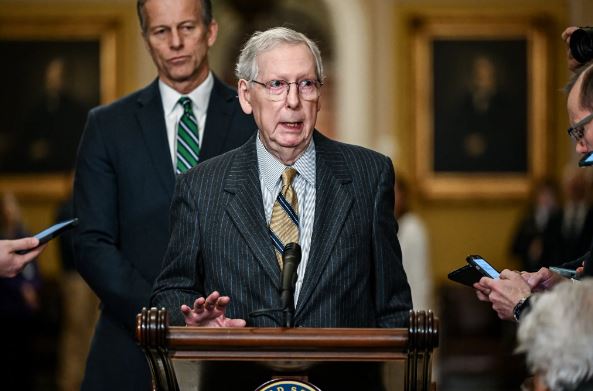Former President Donald J. Trump’s recent inflammatory remarks about immigrants are causing a stir among Senate Republicans, with Senate Minority Leader Mitch McConnell offering an indirect but pointed response. The feud centers on Trump’s racist attacks against Elaine Chao, McConnell’s wife and the former secretary of transportation, who immigrated to the United States from Taiwan as a child.
In a recent rally, Trump reiterated his divisive rhetoric, claiming that immigrants are “poisoning the blood of our country.” McConnell, responding to a question about Trump’s remarks, subtly criticized the former president by highlighting his previous appointment of Chao to a prominent position. The feud has been ongoing for over a year, with Trump using derogatory nicknames like “Coco Chow” and insinuating that Chao’s ties to China make her and McConnell beholden to the country.
Senate Republicans, including Susan Collins of Maine and Mike Rounds of South Dakota, have condemned Trump’s remarks as “deplorable” and “unacceptable.” Collins emphasized that such comments have no place, especially coming from a former president. Rounds criticized the rhetoric, stating it is inappropriate, and called for the celebration of diversity.
McConnell’s careful response underscores the delicate position some Republicans find themselves in as Trump continues to dominate the polls in the GOP presidential race. Despite McConnell’s efforts to distance the party from Trump, particularly after the Capitol riot on January 6, 2021, he acknowledges the former president’s significant influence within the party.
The current political landscape also involves Senate Republicans negotiating with the Biden administration on a deal that proposes extensive immigration restrictions in exchange for additional military aid to Ukraine and Israel, key priorities for President Biden. While McConnell did not directly criticize Trump’s language, his measured response aligns with the delicate balance Senate Republicans must maintain.
Senate Majority Leader Chuck Schumer, a Democrat, condemned Trump’s remarks as “despicable” but indicated that Senate Democrats would proceed with negotiations on border restrictions, acknowledging the existing challenges at the border.
Several Senate Republicans offered nuanced responses, highlighting their immigrant heritage or emphasizing the nation’s identity as a nation of immigrants. John Thune, the second-ranking Senate Republican, shared that his grandfather was an immigrant, distancing himself from Trump’s views while acknowledging the need for immigration enforcement.
However, not all Senate Republicans distanced themselves from Trump’s language. Senator Tommy Tuberville, who had previously defended white supremacists in the military, expressed disappointment that Trump’s remarks weren’t stronger. He claimed that the country was being overrun and suggested immigrants were taking control.
Senator J.D. Vance of Ohio supported Trump’s rhetoric, stating it was “objectively and obviously true” that illegal immigrants were “poisoning the blood of the country.” Vance accused a reporter of attempting to narrow the immigration debate by questioning Trump’s words.
Representative Nicole Malliotakis, the only Republican in a House seat in New York City, downplayed Trump’s remarks, asserting that he was referring to Democratic policies rather than immigrants. She emphasized Trump’s personal connections to immigrants, including being married to immigrants and hiring them.
As the GOP grapples with internal divisions over Trump’s rhetoric and immigration policies, the delicate dance between distancing from controversial remarks and aligning with core party principles continues. The impact of these dynamics on the party’s future direction remains uncertain, as Republicans navigate a complex political landscape.

